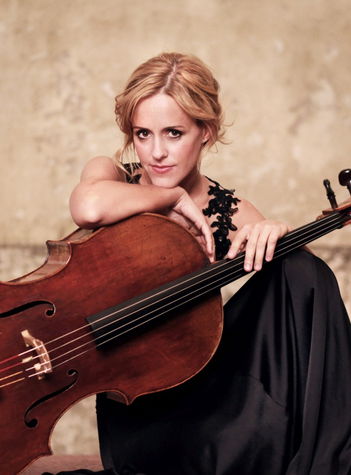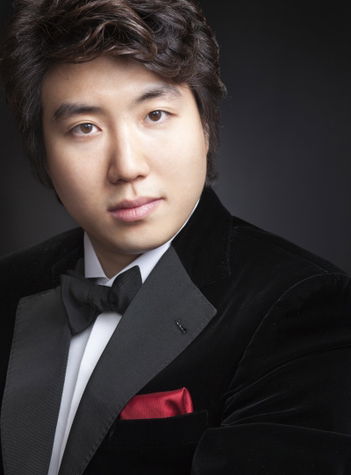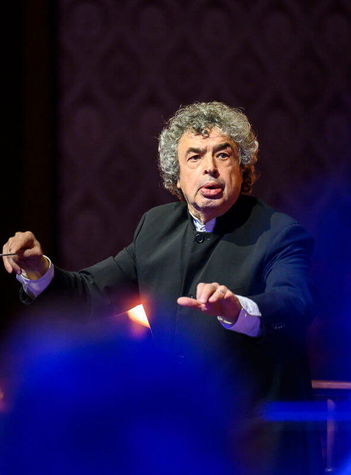Programme
Edward Elgar
Cello Concerto in E minor, Op. 85
Igor Stravinsky
Pulcinella, a concert performance of the ballet music
Secure your seat for the 2025/2026 season – presales are open.
Choose SubscriptionThe star cellist Sol Gabetta calls Elgar’s Cello Concerto her very favourite work in the genre. Contrasting with that work’s gloomy atmosphere under the influence of the First World War is Pulcinella, Stravinsky’s ballet with singing from the same period. Everything will be played under the baton of chief conductor Semyon Bychkov.
Subscription series C
Edward Elgar
Cello Concerto in E minor, Op. 85
Igor Stravinsky
Pulcinella, a concert performance of the ballet music
Sol Gabetta cello
Stefanie Irányi soprano
Martin Mitterrutzner tenor
Jongmin Park bass
Semyon Bychkov conductor
Czech Philharmonic

“I am more alone and the prey of circumstances than ever before. Everything good and nice and clean and fresh and sweet is far away—never to return.”
– letter from Edward Elgar dated 1919
When Elgar wrote his Cello Concerto in 1919, besides suffering from ill health, he was also dealing with the traumatic aftermath of the horrors of World War I. According to the Argentine cellist Sol Gabetta, however, one must take a more complex view of the work.
“It is enormously moving, especially the beginning and the end, which appear like two Greek columns. It is amazing what you can find between them! Elgar wrote the concerto late in life when he was not well, but it is often forgotten that there is more there than just melancholy. Especially the second movement has plenty of humour and life. That is surprising! It is almost as if it doesn’t belong there, yet it is a part of it.”
Gabetta regards the composition as a platform that lets the instrument shine like few others. The concerto was not made popular until the 1960s by her legendary colleague Jacqueline du Pré, demonstrating the importance of soloists as “interpreters who communicate compositions”.
Gabetta has clear ideas about the work’s interpretation: “Preconceived ideas stop up your ears. This is also important to me when teaching. I don’t want my students to play like I do! Sometimes they offer something that I don’t like at first, but that does not mean it isn’t good. My task is then to help them find a convincing way on the basis of their taste and interpretation. It is also important to be sure of yourself and of your interpretation. Only then can you convince the public. When people—young, old, critics, whoever—come to a concert with a fixed opinion and are no longer listening, that’s a problem. Anyone who has never heard a composition before automatically comes with open ears and immediately notices: It touches me—or it does not.”
Sol Gabetta cello

“Wit, aristocratic poise and elegance; mercurial shifts of mood, intensity and lightness of touch in near-miraculous balance.”
– The Glasgow Herald
Sol Gabetta achieved international acclaim upon winning the Crédit Suisse Young Artist Award in 2004 and making her debut with Wiener Philharmoniker and Valery Gergiev. Born in Argentina, Gabetta won her first competition at the age of ten, soon followed by the Natalia Gutman Award as well as commendations at Moscow’s Tchaikovsky Competition and the ARD International Music Competition in Munich. A Grammy Award nominee, she received the Gramophone Young Artist of the Year Award in 2010 and the Würth-Preis of the Jeunesses Musicales in 2012.
Following her highly acclaimed debuts with Berliner Philharmoniker and Sir Simon Rattle at the Baden-Baden Easter Festival in 2014 and at Mostly Mozart in New York in August 2015, this season saw Gabetta debut with Los Angeles Philharmonic and Houston Symphony. She also performed with Tonhalle-Orchester Zürich and St Petersburg Philharmonic Orchestra. Brussels’s Palais des Beaux Arts also welcomeed her as their resident artist. To conclude 2015/2016 Gabetta joined the Royal Concertgebouw Orchestra on a European tour with performances at Lucerne Festival, Grafenegg Festival as well as Salzburger Festspiele.
Gabetta performs with leading orchestras and conductors worldwide including the Orchestra dell’Accademia Nazionale di Santa Cecilia, Washington’s National Symphony Orchestra, Orchestre National de France, Symphonieorchester des Bayerischen Rundfunks, Bamberger Symphoniker, Bolshoi and Finnish Radio Symphony orchestras and The Philadelphia, London Philharmonic and Philharmonia orchestras. She also collaborates extensively with conductors such as Giovanni Antonini, Mario Venzago and Krzysztof Urbański.
In summer 2014 Gabetta was Artist in Residence at the Schleswig-Holstein Musik Festival, having already held residencies at the Philharmonie and Konzerthaus Berlin. She is a regular guest at festivals such as Verbier, Gstaad, Schwetzingen, Rheingau, Schubertiade Schwarzenberg and Beethovenfest Bonn.
As a chamber musician Gabetta performs worldwide in venues such as Wigmore Hall in London, Palau de la Música Catalana in Barcelona and the Théâtre des Champs-Élysées in Paris, with distinguished partners including Patricia Kopatchinskaja and Bertrand Chamayou. Her passion for chamber music is evident in the Solsberg Festival which she founded in Switzerland.
Sol Gabetta was named Instrumentalist of the Year at the 2013 ECHO Klassik Awards for her interpretation of Shostakovich’s Cello Concerto with Berliner Philharmoniker and Lorin Maazel. She also received the award in 2007, 2009 and 2011 for her recordings of Haydn, Mozart and Elgar Cello Concerti as well as works by Tchaikovsky and Ginastera. With an extensive discography with SONY she has also released a duo recital with Hélène Grimaud for Deutsche Grammophon.
Thanks to a generous private stipend by the Rahn Kulturfonds, Sol Gabetta performs on one of the very rare and precious cellos by Givanni Battista Guadagnini dating from 1759. Gabetta has taught at the Basel Music Academy since 2005.
Stefanie Irányi soprano
Martin Mitterrutzner tenor
Jongmin Park bass

Jongmin Park, South Korean bass and native of Seoul, studied singing at the Korea National University of Arts. As a member of the Academy of La Scala, he was guided by Mirella Freni, Luciana Serra, Luigi Alva, and Renato Bruson.
Between 2010-2013 seasons, he was a member of the ensemble at the Hamburg State Opera where he sang leading roles such as Sarastro, Colline, Sparafucile.
From the 2013-14 season, he was invited to join the ensemble at the Vienna State Opera where he performed the roles of Sir Giorgio (I Puritani), Vodník (Rusalka), Ramfis, Gremin, Basilio.
In 2014 he debuted at the ROH Covent Garden as Colline, and appeared at the BBC Proms in London and at the City of London Festival 2014.
He won the International Tchaikovsky Competition, the Song Prize winner at the BBC Cardiff Singer of the World 2015 and the Birgit Nilsson Wagner-Award at the Operalia.
His concert engagements have included Beethoven’s Symphony Nr. 9 with the London Symphony Orchestra, Mozart’s Vesperae solennes de Confessore at La Scala’s annual Christmas concert, Mozart’s Requiem at the Lech Classic Festival, Verdi’s Messa da Requiem with the KBS Symphony in Seoul, and Rossini’s Stabat Mater with the NHK Symphony in Tokyo.
He has performed solo recitals in Munich, Frankfurt and the Musikverein in Vienna. He will make his Wigmore Hall debut in 2017.
Semyon Bychkov conductor

In addition to conducting at Prague’s Rudolfinum, Semyon Bychkov and the Czech Philharmonic in the 2023/2024 season, took the all Dvořák programmes to Korea and across Japan with three concerts at Tokyo’s famed Suntory Hall. In spring, an extensive European tour took the programmes to Spain, Austria, Germany, Belgium, and France and, at the end of year 2024, the Year of Czech Music culminated with three concerts at Carnegie Hall in New York.
Among the significant joint achievements of Semyon Bychkov and the Czech Philharmonic is the release of a 7-CD box set devoted to Tchaikovsky’s symphonic repertoire and a series of international residencies. In 2024, Semjon Byčkov with the Czech Philharmonic concentrated on recording Czech music – a CD was released with Bedřich Smetanaʼs My Homeland and Antonín Dvořákʼs last three symphonies and ouvertures.
Bychkovʼs repertoire spans four centuries. His highly anticipated performances are a unique combination of innate musicality and rigorous Russian pedagogy. In addition to guest engagements with the world’s major orchestras and opera houses, Bychkov holds honorary titles with the BBC Symphony Orchestra – with whom he appears annually at the BBC Proms – and the Royal Academy of Music, who awarded him an Honorary Doctorate in July 2022. Bychkov was named “Conductor of the Year” by the International Opera Awards in 2015 and, by Musical America in 2022.
Bychkov began recording in 1986 and released discs with the Berlin Philharmonic, Bavarian Radio, Royal Concertgebouw, Philharmonia Orchestra and London Philharmonic for Philips. Subsequently a series of benchmark recordings with WDR Symphony Orchestra Cologne featured Brahms, Mahler, Rachmaninov, Shostakovich, Strauss, Verdi, Glanert and Höller. Bychkov’s 1993 recording of Tchaikovsky’s Eugene Onegin with the Orchestre de Paris continues to win awards, most recently the Gramophone Collection 2021; Wagner’s Lohengrin was BBC Music Magazine’s Record of the Year (2010); and Schmidt’s Symphony No. 2 with the Vienna Philharmonic was BBC Music Magazine’s Record of the Month (2018).
Semyon Bychkov has one foot firmly in the culture of the East and the other in the West. Born in St Petersburg in 1952, he studied at the Leningrad Conservatory with the legendary Ilya Musin. Denied his prize of conducting the Leningrad Philharmonic, Bychkov emigrated to the United States in 1975 and, has lived in Europe since the mid-1980’s. In 1989, the same year he was named Music Director of the Orchestre de Paris, Bychkov returned to the former Soviet Union as the St Petersburg Philharmonic’s Principal Guest Conductor. He was appointed Chief Conductor of the WDR Symphony Orchestra (1997) and Chief Conductor of Dresden Semperoper (1998).
Edward Elgar
Cello Concerto in E minor, Op. 85
The English composer Edward Elgar grew up in the family of a church organist who owned a shop that sold sheet music and instruments. Little Edward began playing the piano at school, and he learned to play the organ by watching his father. He also borrowed a variety of instruments from the family shop and taught himself to play them without receiving any kind of instruction, so he soon mastered not only piano and organ, but also violin, viola, cello, and bassoon. He also began composing in a similar manner. At age 16 he became a free-lance musician, so he got experience mainly as an instrumentalist, church organist, and conductor. He mostly composed choral music, but he did not achieve true renown as a composer until he reached the age of 42, when he wrote his Enigma Variations, Op. 36. The great conductor Hans Richter held the work in high esteem and prepared and led its premiere. The idea of creating a set of variations with a secret, “encoded” theme is indicative of Elgar’s unusual imaginativeness, and as a self-taught composer, he was not under any restraints. The work is a covert tribute to the composer’s wife Alice and to the friends who supported Elgar during the years of uncertainty as he got his start as a composer.
Another of Elgar’s most important works is the Cello Concerto in E minor, Op. 85. Just choosing the cello as a solo instrument represents a great challenge for composers. Antonín Dvořák may have put it most succinctly, once warning his composition pupils that unlike the piano or violin, which are capable of carrying themselves in front of an orchestra as ideal solo instruments, the cello does not possess comparable tonal qualities: “it whines up high and mumbles down low”. It is possible that after Elgar’s Violin Concerto (1907–1910), he was taking on a challenge as Dvořák had done—dealing with a difficult compositional task. The solutions the composer selected definitely hint at this. Elgar chose an unusual four-movement layout that differs from most other concertos and is more typical of chamber music, and Elgar’s concerto has a great deal in common with the chamber music genre. The composer deals with the cello’s sonic limitations by using a very delicate instrumental touch, and the music itself is in fact very personal, even intimate in character. Elgar’s musical language achieves perfection in its musical expression of pain and sorrow. The melancholy phrases that descend ever more deeply into despair and gloom are the key to the interpreter’s grasp of the entire work. The concerto dates from a time of great resignation immediately after the First World War. The composer himself was battling illness, but above all he was affected by the decline of his beloved wife’s health. She managed to attend the concerto’s premiere, but she died the following year. Although the premiere on 27 October 1919 featured the superb cellist Felix Salmond, the London Symphony Orchestra, and Elgar conducting, the performance did not turn out well because of a lack of sufficient rehearsal time. The failed premiere proved to be too much for the concerto. Despite the efforts of many outstanding cellists, it was not until 1965 that the work gained wide recognition thanks to the legendary recording made by Jacqueline du Pré, who was 20 years old at the time.
Igor Stravinsky
Pulcinella, a concert performance of the ballet music
The star cellist Sol Gabetta calls Elgar’s Cello Concerto her very favourite work in the genre. Contrasting with that work’s gloomy atmosphere under the influence of the First World War is Pulcinella, Stravinsky’s ballet with singing from the same period. Everything will be played under the baton of chief conductor Semyon Bychkov.